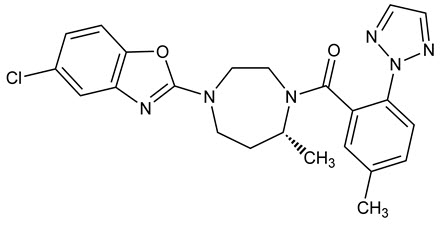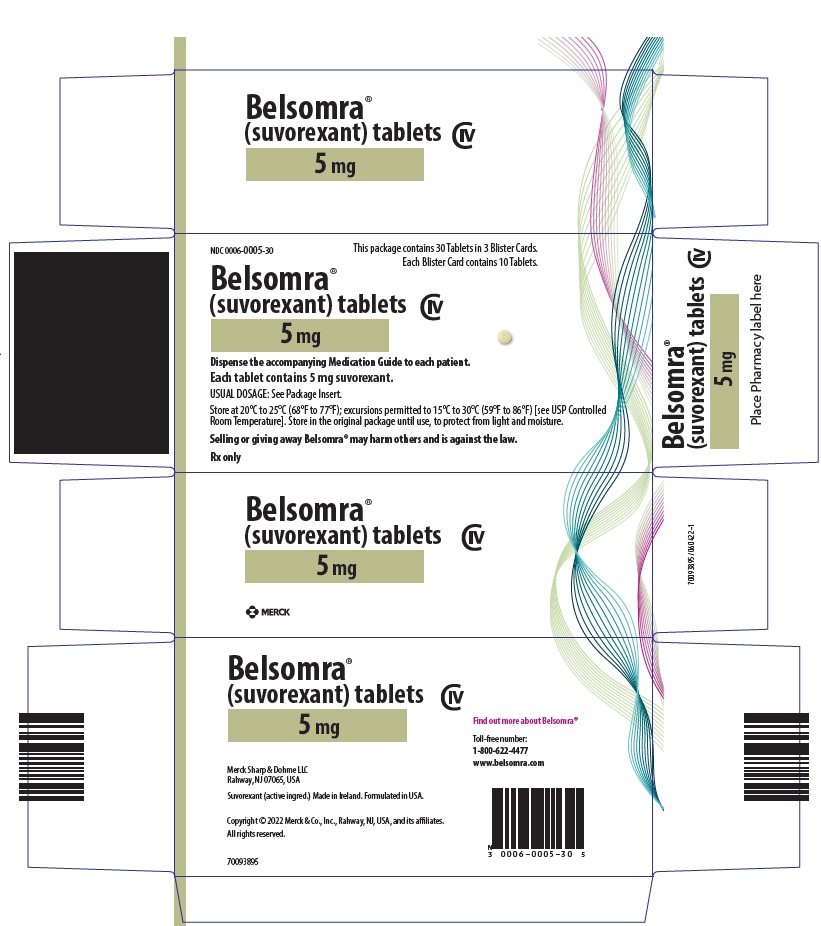Belsomra
Generic name: suvorexant
Drug class: Miscellaneous anxiolytics, sedatives and hypnotics
Medically reviewed by A Ras MD.
What is Belsomra?
Belsomra is a prescription medicine for adults who have trouble falling or staying asleep (insomnia). It is not known if Belsomra is safe and effective in children under the age of 18.
Belsomra is a federally controlled substance (C-IV) because it can be abused or cause dependence. Keep Belsomra in a safe place to prevent misuse and abuse. Selling or giving away Belsomra may harm others and is against the law. Tell your doctor if you have ever abused or have been dependent on alcohol, prescription medicines or street drugs.
Description
BELSOMRA tablets contain suvorexant, an orexin receptor antagonist.
Suvorexant is described chemically as:
[(7R)-4-(5-chloro-2-benzoxazolyl) hexahydro-7-methyl-1H-1,4-diazepin-1-yl][5-methyl-2-(2H-1,2,3-triazol-2-yl)phenyl]methanone
Its empirical formula is C23H23ClN6O2 and the molecular weight is 450.92. Its structural formula is:

Suvorexant is a white to off-white powder that is insoluble in water.
Each film coated tablet contains 5 mg, 10 mg, 15 mg, or 20 mg of suvorexant and the following inactive ingredients: croscarmellose sodium, lactose monohydrate, magnesium stearate, microcrystalline cellulose, and polyvinylpyrrolidone/vinyl acetate copolymer (copovidone).
In addition, the film coating contains the following inactive ingredients: hypromellose, lactose monohydrate, titanium dioxide, and triacetin. The film coating for the 5 mg tablets also contains iron oxide black and iron oxide yellow, and the film coating for the 10 mg tablets also contains FD&C Blue #1/Brilliant Blue FCF Aluminum Lake and iron oxide yellow.
Mechanism of Action
The mechanism of action of suvorexant in the treatment of insomnia is presumed to be through antagonism of orexin receptors. The orexin neuropeptide signaling system plays a role in wakefulness. Blocking the binding of wake-promoting neuropeptides orexin A and orexin B to receptors OX1R and OX2R is thought to suppress wake drive.
What is the most important information I should know about Belsomra?
- Do not take more Belsomra than prescribed.
- Do not take Belsomra unless you are able to stay in bed a full night (at least 7 hours) before you must be active again.
- Take Belsomra within 30 minutes of going to bed.
Belsomra may cause serious side effects that you may not know are happening to you. These side effects include:
- sleepiness during the day
- not thinking clearly
- act strangely, confused, or upset
- “sleep-walking” or doing other activities when you are asleep like eating, talking, having sex, or driving a car.
- Call your doctor right away if you find out that you have done any of the above activities after taking Belsomra.
Who should not take Belsomra?
Do not take Belsomra if you fall asleep often at unexpected times (narcolepsy).
What should I tell my healthcare provider before taking Belsomra?
Before taking Belsomra, tell your doctor about all of your medical conditions, including if you:
- have a history of depression, mental illness, or suicidal thoughts
- have a history of drug or alcohol abuse or addiction
- have a history of a sudden onset of muscle weakness (cataplexy)
- have a history of falling asleep often at unexpected times (narcolepsy) or daytime sleepiness
- have lung problems or breathing problems
- have liver problems
- are pregnant or plan to become pregnant. It is not known if Belsomra can harm your unborn baby.
- are breastfeeding or plan to breastfeed. It is not known if Belsomra passes into your breast milk.
Tell your doctor about all the medicines you take, including prescription or over-the-counter medicines, vitamins, or herbal supplements. Medicines can interact with each other, sometimes causing serious side effects. Do not take Belsomra with other medicines that can make you sleepy unless your doctor tells you to.
Know the medicines you take. Keep a list of your medicines with you to show your doctor and pharmacist each time you get a new medicine.
How should I take Belsomra?
- Take Belsomra exactly as your doctor tells you to take it.
- Only take Belsomra 1 time each night, if needed, within 30 minutes of going to bed.
- Only take Belsomra when you can get a full night’s sleep (at least 7 hours).
- Do not take Belsomra if you drank alcohol that evening or before bed.
- Belsomra may be taken with or without a meal. However, Belsomra may take longer to work if you take it with or right after meals.
- Call your doctor if your insomnia (sleep problem) worsens or is not better within 7 to 10 days. This may mean that there is another condition causing your sleep problem.
- If you take too much Belsomra, call your doctor right away or get emergency treatment.
What should I avoid while taking Belsomra?
- Do not drink alcohol while taking Belsomra. It can increase your chances of getting serious side effects.
- Do not drive, operate heavy machinery, do anything dangerous or do other activities that require clear thinking after taking Belsomra.
- You may still feel drowsy the next day after taking Belsomra. Do not drive or do other dangerous activities until you feel fully awake.
What are the possible side effects of Belsomra?
Belsomra may cause serious side effects including:
- See “What is the most important information I should know about Belsomra?”
- abnormal thoughts and behavior. Symptoms include more outgoing or aggressive behavior than normal, confusion, agitation, hallucinations, worsening of depression and suicidal thoughts or actions.
- memory loss
- anxiety
- temporary inability to move or talk (sleep paralysis) for up to several minutes while you are going to sleep or waking up.
- temporary weakness in your legs that can happen during the day or at night.
The most common side effects of Belsomra include drowsiness the next day after you take Belsomra.
The following additional side effects have been reported with Belsomra:
- abnormal dreams
These are not all the possible side effects of Belsomra. For more information, ask your doctor or pharmacist.
Call your doctor for medical advice about side effects. You may report side effects to FDA at 1-800-FDA-1088.
General information about the safe and effective use of Belsomra
Medicines are sometimes prescribed for purposes other than those listed in a Medication Guide. Do not use Belsomra for a condition for which it was not prescribed. Do not give Belsomra to other people, even if they have the same symptoms that you have. It may harm them.
This Medication Guide summarizes the most important information about Belsomra. You can ask your pharmacist or doctor for information about Belsomra that is written for health professionals.
For more information, go to www.Belsomra.com or call 1-800-622-4477.
How should I store Belsomra?
- Store Belsomra at room temperature between 68°F to 77°F (20°C to 25°C).
- Store in the original package until use, to protect from light and moisture.
- Keep Belsomra and all medicines out of reach of children.
What are the ingredients in Belsomra?
Active ingredient: Suvorexant
Inactive ingredients: Polyvinylpyrrolidone/vinyl acetate copolymer (copovidone), microcrystalline cellulose, lactose monohydrate, croscarmellose sodium, and magnesium stearate. The film coating contains: lactose monohydrate, hypromellose, titanium dioxide, and triacetin. The film coating for the 5 mg tablets also contains iron oxide yellow and iron oxide black, and the film coating for the 10 mg tablets also contains iron oxide yellow and FD&C Blue #1/Brilliant Blue FCF Aluminum Lake.
Label
PRINCIPAL DISPLAY PANEL – 5 MG TABLET BLISTER CARD CASE CARTON
- NDC 0006-0005-30
- This package contains 30 Tablets in 3 Blister Cards.
Each Blister Card contains 10 Tablets. - Belsomra®
(suvorexant) tablets
CIV
5 mg - Dispense the accompanying Medication Guide to each patient.
- Each tablet contains 5 mg suvorexant.
- USUAL DOSAGE: See Package Insert.
- Store at 20°C to 25°C (68°F to 77°F); excursions permitted to 15°C to 30°C (59°F to 86°F) [see USP Controlled
Room Temperature]. Store in the original package until use, to protect from light and moisture. - Selling or giving away Belsomra® may harm others and is against the law.
- Rx only

SRC: NLM .
